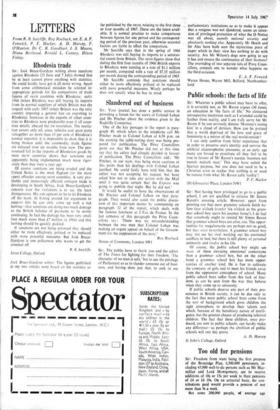Sir: Not having been privileged to go to a public
school, I am not qualified to criticise Mr Simon Raven's amusing article. However, apart from pointing out that most grammar schools finish be- fore four o'clock (confer `six o'clock as the gram- mar school boy starts his journey home'), I do feel that somebody ought to remind Mr Simon Raven that grammar school boys are alive, too. The oppor- tunities for megalomania are perhaps not-as good, but they exist nevertheless. A grammar school boy may not see his rival working out his emotional conflicts in bed, but there is still plenty of personal animosity and rivalry in his life.
Of course, the public school boy might see more of these elevating emotional contortions than a grammar school boy, but on the other hand a grammar school boy has more oppor- tunities of another kind. He is free to cultivate the company of girls and to meet his friends away from the oppressive atmosphere of school. Many public school boys suffer from this lack of free- dom, as can be seen from the way they behave when they come up to university.
If public schools deserve any part of their pro- minence in British society, it can be due only to the fact that most public school boys come from the sort of background which gives children the right atmosphere to develop their talents and which, because of the hereditary nature of intelli- gence, has the greatest chance of producing talented children. The fact that these children, once pro- duced, are sent to public schools, can hardly make any difference—as perhaps the abolition of public schools will one day prove.






























 Previous page
Previous page